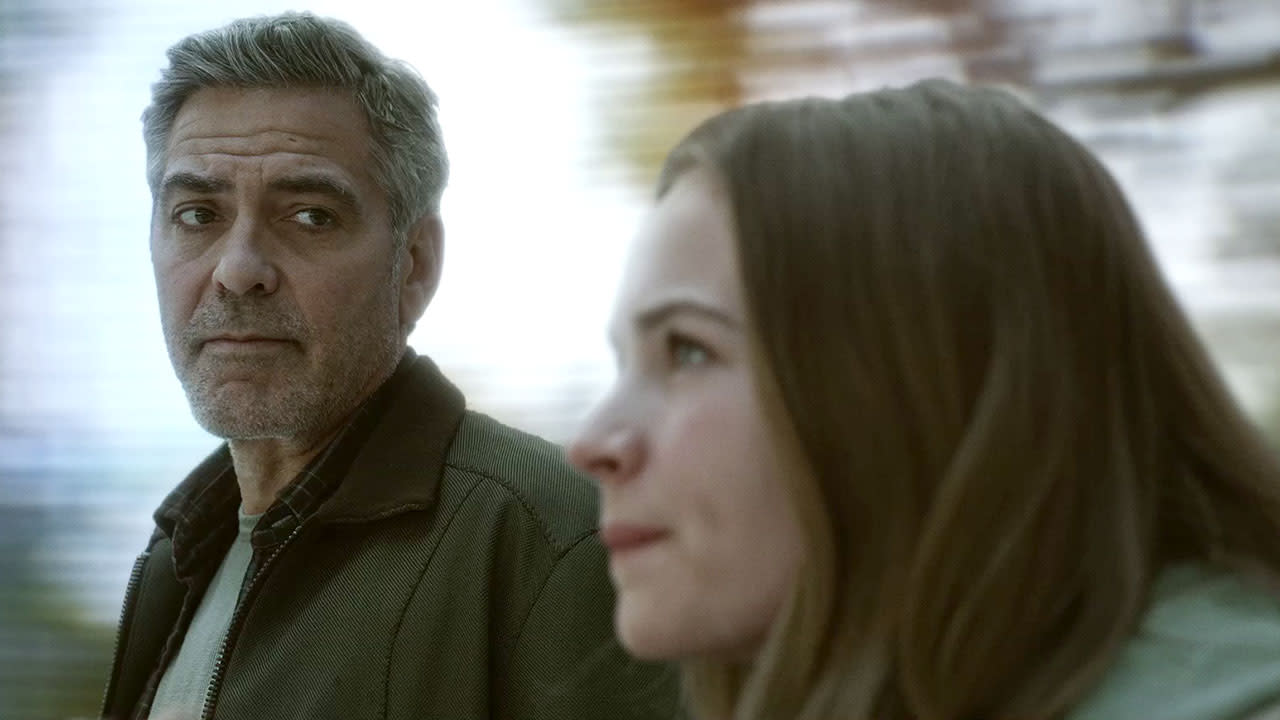Thursday, 4 June 2015
Can we fix it?: "Tomorrowland: A World Beyond"
Tomorrowland has one of those openings that fair screams reshoots, or script problems, and which can only shake whatever faith we brought with us into the cinema. Here is George Clooney, as a character we've not been properly introduced to, bellowing down the camera lens about the problems of a world we as yet know nothing of. You can see the rationale, and the notes being handed down from executives to creatives: if you have got Clooney's name on the poster of your $190m movie, it behoves you to get him into its first reel so as to reassure the audience, even if his character has no real business being there. (Also: Clooney can just about shore up anything, right?)
The foundations are thus altogether shakily laid for what early scenes of stargazing and jetpack-riding announce as one of those keep-watching-the-skies sci-fi dramas, designed by its authors (Lost and Prometheus scribe Damon Lindelof, and the director Brad Bird) with an eye to getting us to look up at a moment when so many of us are busier scrolling through the bad news mounting on our Twitter feeds. As films derived from theme park attractions go, Tomorrowland is some way more ambitious - and, indeed, adventurous - than The Haunted Mansion or any of the Pirates of the Caribbeans, establishing a debate between optimism and pessimism, where those earlier films threw in their lot with rank commercial cynicism.
The trouble - which Bird looks to have been addressing with that opening - is that the representatives of this debate spend at least half the movie in entirely separate films. The first act introduces us to the younger version of Clooney's Frank Walker, a child of the post-war World's Fair generation - the maths don't entirely add up - who, with the years, grows convinced that everything of promise on this Earth has long gone, and eventually resigns himself to cranky solitude. Belatedly, we meet Casey (Britt Robertson), latter-day teenager and repository of wonder, curiosity and positivity - the kind of can-do teen whose response, upon hearing grim tidings from her elders, is a bright "Can we fix it?"
That's an interesting question for any film to raise, although you might wonder - as I did - whether a summer event movie, where money is no object, is the most rigorous forum in which to raise it. $190m gets you plenty of visual invention, it's true, and that may be enough to zoom some viewers past Tomorrowland's flaws of narrative and rhetoric. Once Casey is granted access to the futureworld of the title, the screen fills with towers and maglevs; late on, a Jules Verne rocketship is seen blasting out of the centre of the Eiffel Tower. Some of this is genuine good fun: Casey winds up in a shootout with Kathryn Hahn and Keegan-Michael Key as the robotic proprietors of a memorabilia store, and has to make her escape amid flying R2D2s and Gorts.
Bird's background in animation shows through in the cartoonish ways he finds for Casey and chums to see off their metallic pursuers - hitting them with a tuning fork or thwacking them with baseball bats, having them cubed by cheesewire laserbeams. The memorabilia store scene is doubly significant in identifying Bird's film as the work of SF scholars: baby boomers raised on not just Star Wars, but Things to Come and The Day The Earth Stood Still, and who therefore have no problem halting their pyrotechnics in order to air some pointed social commentary.
If nothing else, Tomorrowland might usefully stand as a lesson in just how difficult it must be, even for a name director, to merge a crowdpleaser with a thinkpiece in the modern movie marketplace. It can be done, of course: Bird's own The Incredibles was, among other things, an animated treatise on why society is so keen to settle for mediocrity. Yet that film came out of Pixar's imperial phase, when the company had confidence enough to reject all notes from higher up, and forge ahead on their own instincts. Tomorrowland, by contrast, is the product of an increasingly dysfunctional studio system that insists you can't cast Clooney in a $190m summer movie and have him sit around on the sidelines in a second-banana part.
It was a gamble on Bird's part to cast this ever-clubbable actor as a shut-in, but you can see why nobody's thought to do it before. Even when Frank's at his crankiest, Clooney appears this close to buying the crew a round and taking his young co-stars to play mini-golf; for the character's redemption to be anything like as affecting as the film hopes, it would have required a more lived-in, perhaps less starry performer, one far more persuasive in his hopelessness. Tomorrowland truly, sincerely wants us to believe - in the way many of the best Disney movies do - but Bird's trademark dynamism can only get us up and over so many of the bumps and knots in his own storytelling. Here's a thought this lavish folly cannot countenance: what if committee thinking is the thing that's been holding us back?
Tomorrowland is now playing in cinemas nationwide.
Subscribe to:
Post Comments (Atom)

No comments:
Post a Comment